#George Mantel
Text

First ref was randomized to be Gman (George Mantel). Who would you like to see next?
53 notes
·
View notes
Note
Your thoughts on the prolific author Jean Plaidy? Did you read any of her books? Do you have favorite/most hated? What do you think about her view on the Tudors, Boleyn's, Yorks, Stuarts, Hapsburgs, etc?
I have found them very dull, paint by the numbers, etc. Honestly I find most of the novels from that era of that era that way, though, it's part of why I can't stand Weir's, hers just feel like a complete emulation of Norah Loft's which are also that way for me. I feel like newer authors of the genre are more likely to take risks, even if all their creative decisions are not my favorite, I can respect that (Suzannah Dunn, Christopher Rae, etc).
To be more specific, as a Henry VIII Enjoyer, these novels miss the mark for me. He's always very one-dimensional, sadistic satyr meets bluff hail-fellow-well-met, extremely pliable and easy to manipulate; it's just very boring and not satisfying to read.
#anon#very unpopular but to some degree i would even say philippa gregory > jean plaidy#(just as far as...entertainment? her depiction of henry is also like that. altho the film adaptation somehow made it even worse)#and philippa gregory > alison weir again very limitedly and only pertaining to fiction#(bcus honestly i think weir's depiction of henry might be even worse than pgreg)#(maybe even worse than margaret george's which is saying A LOTTT)#(probably as bad as norah loft's. but she's a fan. so)#i actually have some sliding door theories on pgreg tho#i basically think that her books were the gateway for weir gaining credibility#bcus they were so outrageous (a very hateful and homophobic interpretation of a slightly less but still homophobic theory from warnicke)#they made weir seem moderate and credible in comparison#and we have been stuck with that albatross ever since. god hates us every one.#i also believe weir segued to mantel's popularity to some extent#it demonstrated the popularity and marketability of that sort of portrayal of AB#cerebral ; cold; calculating and very fun to hate#of course that began earlier but while LiT is more sympathetic than some of her later works;#you definitely get the sense AW is having a lottt of fun hating her in certain sections#(earlier with TOBG i should say)#whatever tf pgreg said about her#'of criminal nature' agrewafrhdsijfs
2 notes
·
View notes
Text
Close, no cigar

Still got his name wrong.
#Archie Comics#Betty Cooper#Reggie Mantle#Mantee#Mantel#casual threats of homicide#George Frese#1950
2 notes
·
View notes
Text
Why Fantasy Readers Should Dive into Historical Fiction: 5 Must-Read Novels
As a fantasy reader, you might be drawn to the novels of J.R.R. Tolkien, George R.R. Martin, and other masters of the genre.
You revel in the magical realms, mythical creatures, and epic battles that define the world of fantasy literature.
But have you ever considered exploring the equally enthralling world of historical fiction?
Historical fiction novels share many of the same qualities that…

View On WordPress
#9th-10th-century Britain#ancient Celtic world#Bernard Cornwell&039;s Saxon Stories#Celtic lore#Fantasy Readers#George R.R. Martin#gripping storylines#Hilary Mantel&039;s Wolf Hall#historical fiction#intellectual thriller#intricate world-building#J.R.R. Tolkien#Manda Scott&039;s Boudica series#medieval monastery#Merry Men#must-read novels#Outlaw series#rich characterization#Robin Hood#The Last Kingdom series#Thomas Cromwell trilogy#Tudor England#Umberto Eco&039;s The Name of the Rose#Viking Age#world of fantasy literature
0 notes
Text
Burnt #FridayPhilosophy
Summer in the desert.
Burnt #FridayPhilosophy
It’s summer in the desert. This photo shows you what it’s like here, right now. Today the outside temperatures reached 118 degrees. Needless to say, we all try to hide indoors for the summer months. In keeping with the fact that it’s beyond hot here, today’s #FridayPhilosophy is all about feeling the heat.
“Told me if I did not smell of the fire then I smelled of the…

View On WordPress
0 notes
Note
hey, i find your posts about historical fiction pretty interesting, do you have any recs?
anon this is the most beautiful and validating ask i have ever received. absolutely of COURSE I have recs. not gonna be a lot of deep cuts on this list but i love all of these books and occasionally books do receive awards and acclaim because they are good. in no particular order:
the cromwell trilogy by hilary mantel. of course i gotta start with the og. it’s 40 million pages on the tudor court and the english reformation and it will fundamentally change you as a person and a reader
(sub rec: the giant, o’brien by hilary mantel. in many ways a much shorter thematic companion to the cromwell trilogy imo. about stories and death and embodiment and the historical record and 18th century ireland. if you loved the trilogy, read this to experience hils playing with her own theories about historical fiction. if you are intimidated by the trilogy, read this first to get a taste of her prose style and her approach to the genre. either way please read all four novels ok thanks)
lincoln in the bardo by george saunders. the book that got me back into historical fiction as an adult. american history as narrated by a bunch of weird ghosts and abraham lincoln. chaotic and lovely and morbid.
the everlasting by katy simpson smith. rome through the ages as seen by a medici princess, a gay death-obsessed monk, and an early christian martyr. really historically grounded writing about religion and power, and also narrated with interjections from god’s ex boyfriend satan. smith is a trained historian and her prose slaps
(sub rec: free men by katy simpson smith. only a sub rec bc i read it a long time ago and my memory of it is imperfect but i loved it in 2017ish. about three men in the woods in the post revolutionary american south and by virtue of being about masculinity is actually about women. smith did her phd in antebellum southern femininity and motherhood iirc so this book is LOCKED IN to those perspectives)
a mercy by toni morrison. explores the dissolution of a household in 17th century new york. very different place and time than a lot of morrison’s bigger novels but just as mean and beautiful
(sub rec: beloved by toni morrison. a sub rec bc im pretty sure everyone has already read beloved but perhaps consider reading it again? histfic ghost story abt how the past is always here and will never go away and loves you and hates you and is trying to kill you)
an artist of the floating world by kazuo ishiguro. my bestie sir kazuo likes to explore the past through characters who, for one reason or another (amnesia, dementia, being a little baby robot who was just born yesterday, etc), are unable to fully comprehend their surroundings. this one is about post-wwii japan as understood by an elderly supporter of the imperial regime
(sub rec: remains of the day by kazuo ishiguro. same conceit as above except this time the elderly collaborator is incapable of reckoning with the slow collapse of the system that sheltered him due to britishness.)
the pull of the stars by emma donoghue. donoghue is a strong researcher and all of her novels are super grounded in their place and time without getting so caught up in it they turn into textbooks. i picked this one bc it is a wwi lesbian love story about childbirth that made me cry so hard i almost threw up on a plane but i recommend all her histfic published after 2010. before that she was still finding her stride.
days without end by sebastian barry. this one is hard to read and to rec bc it is about the us army’s policy of genocide against native americans in the 19th century west as told by an irish cavalry soldier. it is grim and violent and miserable and also so beautiful it makes me cry about every three pages. first time i read it i was genuinely inconsolable for two days afterwards.
this post is long as hell so HONORABLE MENTIONS: the amazing adventures of kavalier & clay by michael chabon, the western wind by samantha harvey, golden hill by frances spufford, barkskins by annie proulx, postcards by annie proulx, most things annie proulx has written but i feel like i talk about her too much, the view from castle rock by alice munro, the name of the rose by umberto eco, tracks by louise erdrich
#honestly will probably be coming back with additions bc this is just based on whats currently on my bookshelf#made this post while staring at the copy of mirror & the light i keep on my desk as some kind of hilary mantalisman#send me your address so i can explain my passions etc etc#histfic
161 notes
·
View notes
Text

Bruce absolutely breaking down over the loss of Jason and taking it out on Dick, the most available and easy target in this moment. Blaming anyone else because he can’t bear the weight nor admit the guilt he feels—that his statements should be directed at himself. Bruce feels resentment at himself that he never adopted Dick like he did Jason.
Full Pages:
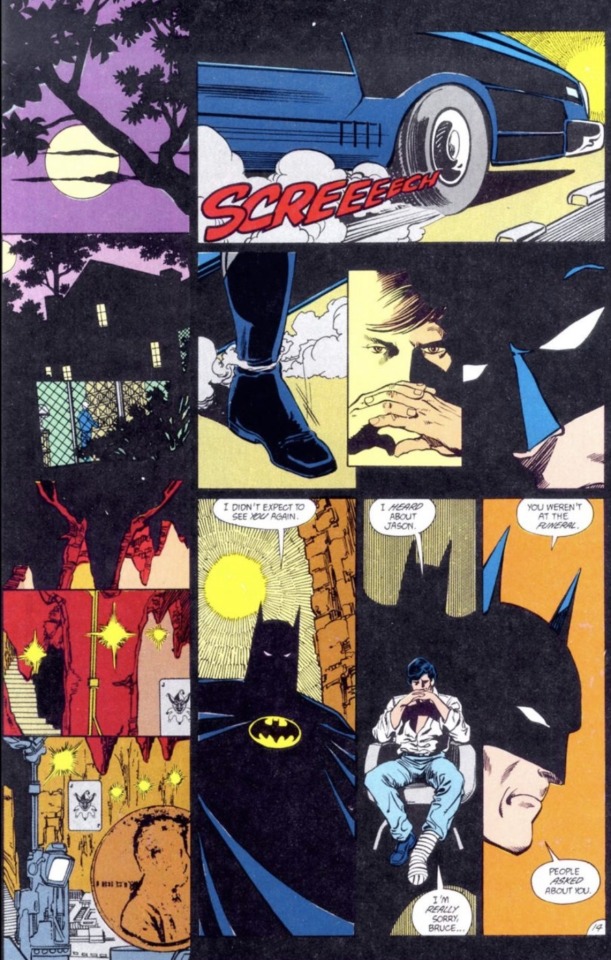

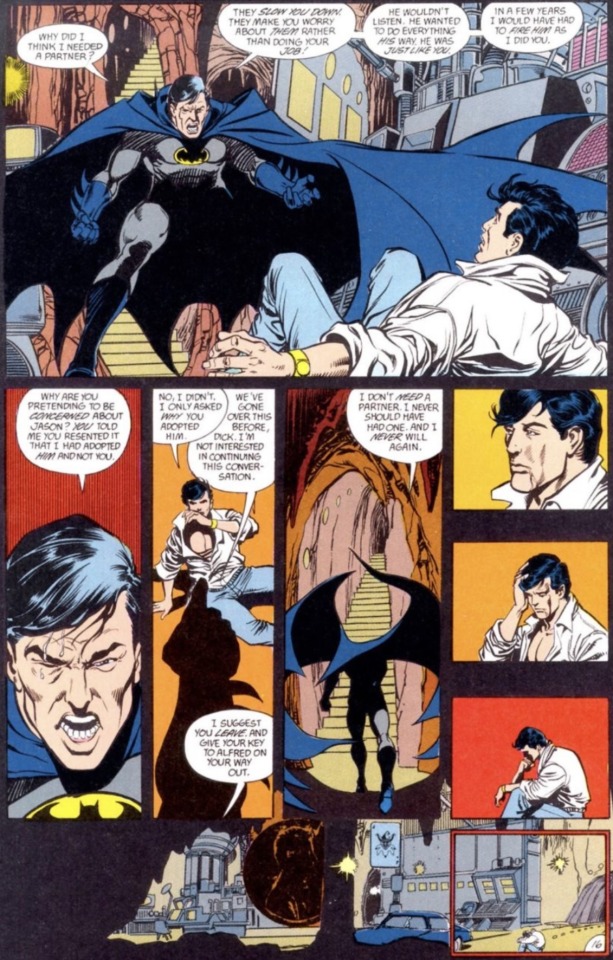
Also, I appreciate the slowly distancing fade out of the last several panels as a visual display of the emotional reflection Dick’s living in this moment with the batcave as an allegory of the tumultuous upheaval the bat mantel has wrought on the family in the here and now.
Comic: New Teen Titans #55
Writer: Marv Wolfman
Artist: George Perez
#Jason Todd#Dick Grayson#Bruce Wayne#Teen Titans#New Teen Titans#New Teen Titans 55#Nightwing#Batfamily#Batman#Robin#DC Comics#Emotionally Constipated Bruce Wayne#Violence is Not the Answer Bruce#Not When It Comes to Family#(Verse People Trying to Kill You)#Dick Grayson Needs a Hug#These Men Need a Hug#And Therapy#So Much Therapy
91 notes
·
View notes
Text






















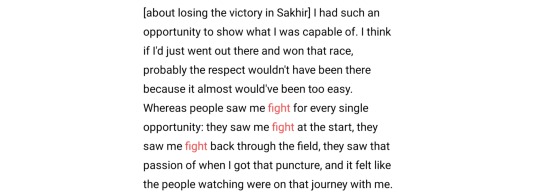





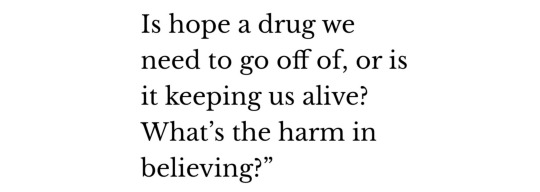










GR : confidence, contrasts, hope and other big words
sources below the cut:
Square Mile: George Russell: "I'm ready to fight." // Russell admits he's not wasy to work with // // Ready for Takeoff with George Russell // The Telegraph: Why George Russell believes he is ready to win the world title // F1: George Russell is destined for the top - just ask Alonso //The Telegraph // Oh Ana by Mother Mother // Alex Albon appraises George Russell's Mercedes move after replacing him at Williams // The next Hamilton? Autocar meets F1 prodigy George Russell // Hadestown, Come Home with Me // The Race // Criminal by Britney Spears // Roland Barthes: A Lover's Discourse: Fragments // Audre Lorde, “From the House of Yemanjá”, The Collected Poems of Audre Lorde // --- // High Performance Podcast //--- // Hilary Mantel: Wolf Hall // Primadonna by Marina and the Diamonds // Icarus Interlude by Zayn // --- // Try by P!nk // C.S. Lewis // --- // --- // Rainer Maria Rilke tr. by Anita Barrows from The Book of Hours // man I don't fking know anymore, it's from an article after Jeddah 23
#george russell#f1#web weaving#*m#*mine#🖤#(my toxic trait is screenshotting everything but not tracking sources)
216 notes
·
View notes
Text
Books to read in autumn
Historical novels
Wolf Hall by Hilary Mantel: England in the 1520s
The Pillars of the Earth by Ken Follett: Building the most splendid Gothic cathedral the world has ever known
Outlander by Diana Gabaldon: A back-in-time Scottish romance
Company of Liars by Karen Maitland: A novel of the plague in the year 1348
The underground railroad by Colson Whitehead: Enslavement of African Americans through escape and flight
The God of small things by Arundhati Roy: A family drama in the 60s located in India
The Diary of a Young Girl by Anne Frank: A powerful reminder of the horrors of world war II
Fantasy
A Game of thrones by George R. R. Martin: A Fantasy epic run by politics, strong families, dragons
Red rising by Pierce Brown: A dystopian science fiction novel set in a future colony on Mars
Babel by R.F. Kuang: Student revolutions, colonial resistance, and the use of language and translation as the dominating tool of the British empire
Legends & Lattes by Travis Baldree: A fresh take on fantasy staring an orc and a mercenary
Jade City by Fonda Lee: A gripping Godfather-esque saga of intergenerational blood feuds, vicious politics, magic, and kungfu
Spinning Silver by Naomi Novik: A tale of hope and magic, with brave maidens and scary monsters
The Atlas six by Olivie Blake: A dark academic sensation following six magicians
Mysteries & Horror
The Gathering Dark: An Anthology of Folk Horror by various authors: Short stories perfect for the Halloween mood
Sorrowland by Rivers Solomon: The story of Vern, a pregnant teenager who escapes the cult Cainland
The Weird and the Eerie by Mark Fisher: A noted cultural critic unearths the weird, the eerie, and the horrific in 20th-century culture through a wide range of literature, film, and music
Holly by Stephen King: Disappearances in a midwestern town
Vampires of El Norte by Isabel Cañas: Supernatural western
The good house by Tananarive Due: A classic New England tale that lays bare the secrets of one little town
Nonfiction
Ghostland: An American History in Haunted Places by Colin Dickey: The trail of America's ghosts
What moves the dead by T. Kingfisher: A gripping and atmospheric retelling of Edgar Allan Poe's classic "The Fall of the House of Usher
South to America: A Journey Below the Mason Dixon to Understand the Soul of a Nation by Imani Perry: A journey through the history, rituals, and landscapes of the American South—and a revelatory argument for why you must understand the South in order to understand America
All the living and the dead by Hayley Campbell: An exploration of the death industry and the people―morticians, detectives, crime scene cleaners, embalmers, executioners―who work in it and what led them there
Gödel, Escher, Bach: An Eternal Golden Braid by Douglas R. Hofstadter: Gödel, Escher, Bach is a wonderful exploration of fascinating ideas at the heart of cognitive science: meaning, reduction, recursion, and much more
#autumn mood#writing#inspiration#history#autumn#fall season#autumn leaves#autumn aesthetic#dark fantasy#dark academia#books and reading#books#books & libraries#bookstagram#currently reading#booklr#reading#book recommendations#writingcommunity#creative writing#writeblr#fall vibes#october#autumn vibes#historical novel#fantasy#fairy tale#fantasy reader#nonfiction#mystery
96 notes
·
View notes
Text
GARTER DAY AT WINDSOR CASTLE
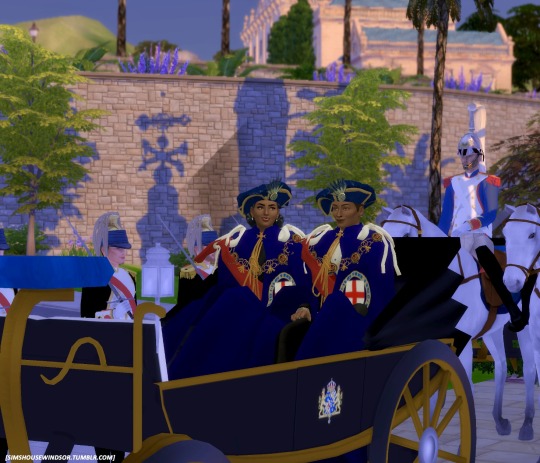

The Queen's first Garter Day as Sovereign of ‘The Order of the Garter’
The Queen, The Prince consort and members of the Royal Family today attended a Garter Day service and ceremony at Windsor Castle. This year's event was the first time The Queen has taken part as Sovereign of ‘The Order of the Garter’.
Last year, The Queen did not attend Garter Day due to being on maternity leave but, The Prince consort and The Earl of Boykins were installed as Royal Knight Companions of the Order of the Garter, having been appointed by Queen Katherine I in 2023.
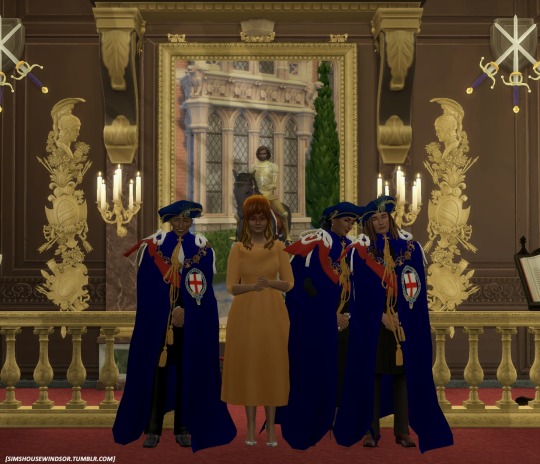
The Emperor (and Empress) of Sulani posed with The Queen and Prince consort after being invested as a Stranger Knight of the Garter.
New appointments to "The Garter" were invested in the Garter Throne Room, including the Lady Hope Spring as a Lady Companion of the Most Noble Order and the Emperor of Sulani as a Stranger Knights Companion of the Most Noble Order of the Garter.

Windsor Castle, which has been the family home of Windenburg Kings and Queen's for over 240 years, is a historic castle, Royal Palace and a family home that is open to visitors for most of the year.
After lunch the Knights process on foot to a service in St. Leo's Chapel, wearing their blue velvet robes, known as mantels, and blue velvet hats with white plumes. The processional route is through the Upper, Middle and Lower Wards of the castle and around the bend to St. Leo's Chapel.

St Leo's Chapel sits in the Lower Ward of Windsor Castle at centre right, partially behind trees.
The Queen attended the service along with other members of the Royal Family in the Order, including The Prince consort, The Duke of Kent, The Duke of Hastings, The Earl of Boykins, and The Queen Mother.
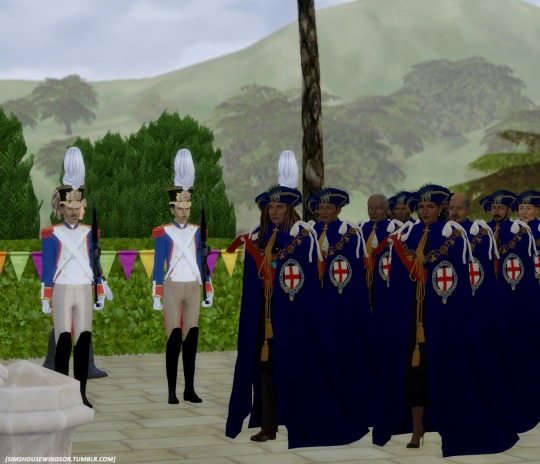
The Emperor of Sulani was given the honor of accompanying Her Majesty into St Leo's chapel.
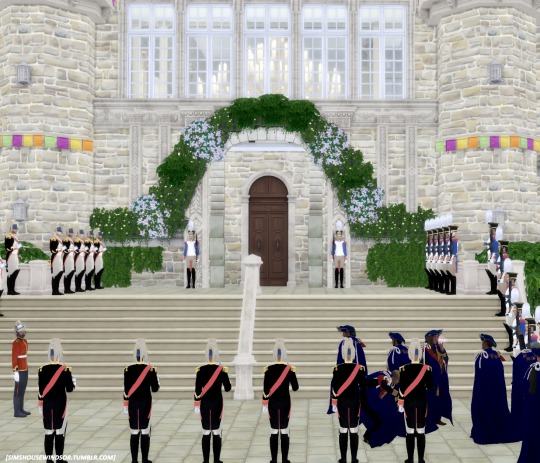
On reaching the chapel there is a short banner service, at the beginning of which the new Companions are installed inside.
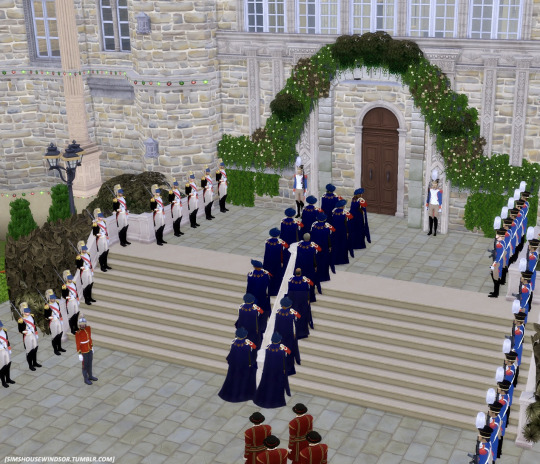
The colorful procession is joined by the Constable and Governor of Windsor Castle and the Military Knights of Windsor.
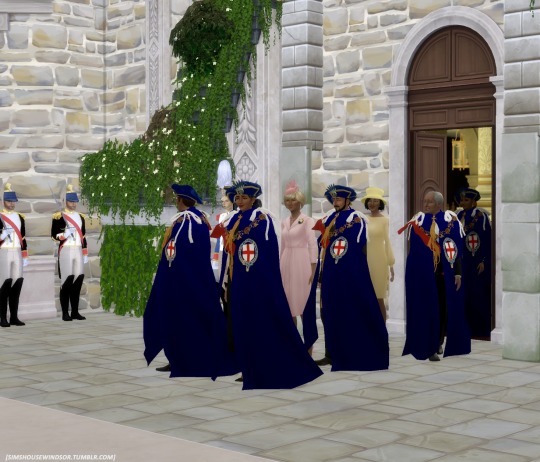
On emerging from the Great West Door of the Chapel, the Sovereign and the other members of the Order return in carriages and cars to the Upper Ward of the castle.
The Queen and Prince consort led the procession out of the chapel, upon their departure from the event.
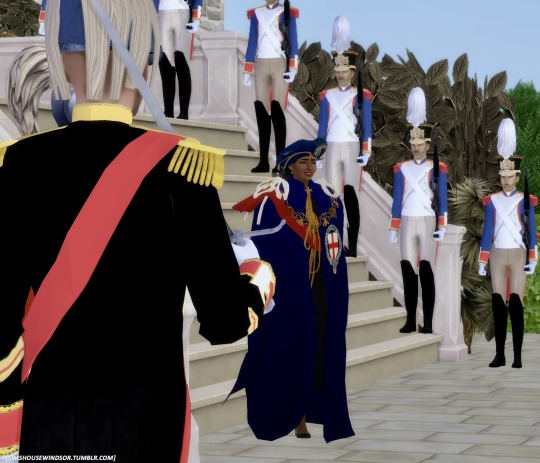
New appointments are announced on St George's Day but the chivalric and installation ceremonies take place every year on the Monday of Royal Ascot week, known as Garter Day.
This year marks The Queens first time celebrating Royal Ascot week after being crowned.
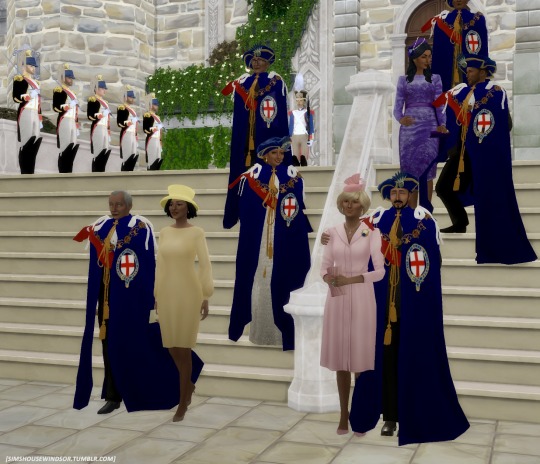
The Queen Mother was beaming as she joined alongside the other senior royals to depart the Order of the Garter service.
The Duchess of Kent was pretty in a pink X gown while The Duchess of Hastings shined bright in a yellow X gown.
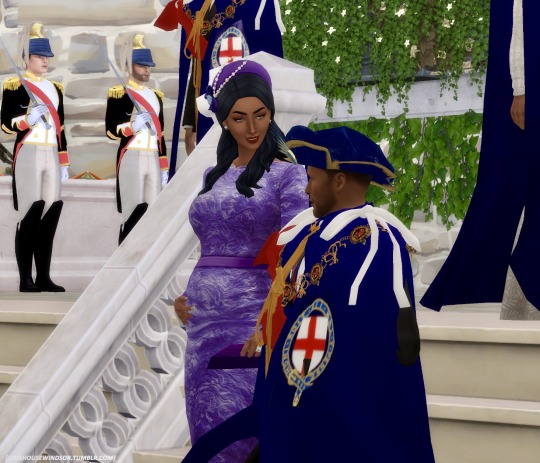
The Earl and Countess of Boykins showed off their growing baby bump. The Earl was installed as a Royal Knight last year.
The Queen's younger sister, wearing a purple X dress, announced her pregnancy almost two months ago. This will be the royal couples first child.
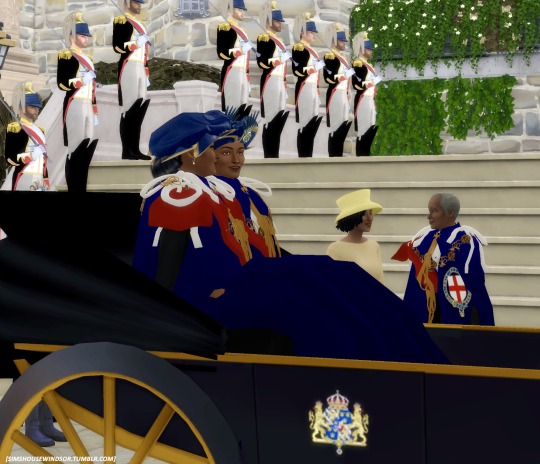
The Duke of Hastings, currently 11th in line to the throne, also attended his first Garter Day. His Royal Highness was the last appointment made by His late Majesty King George I but did not attend last year's service.
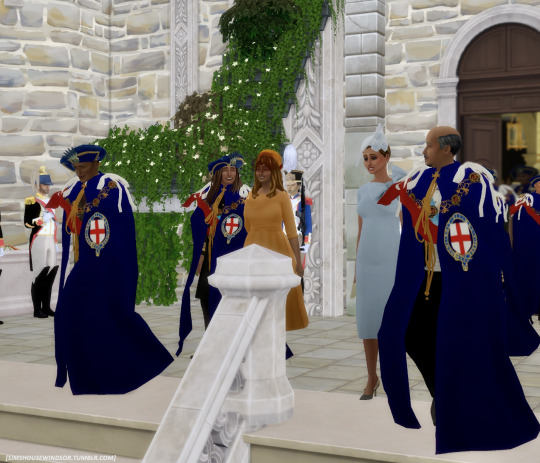
The Order also includes supernumerary members (members of the Windenburg Royal Family and foreign monarchs), known as "Royal" and "Stranger" Knights and Ladies (Companion), respectively.
King Felipe of Oasis Springs, attending this year's Garter Day alongside his wife Queen Aoki, was made a Stranger Knight in 2022.
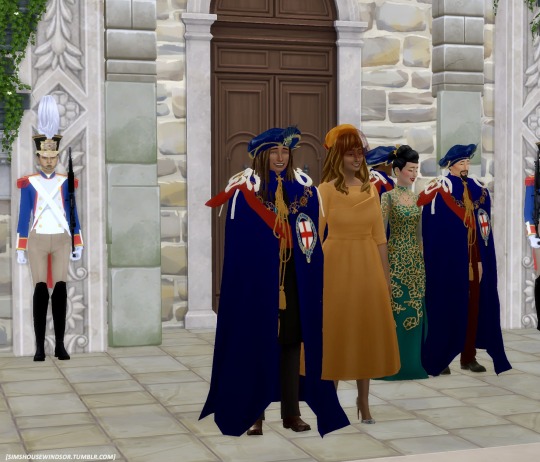
The Emperor and Empress of Sulani were all smiles as they emerged from the chapel. The Emperor is also a distant cousin of the Queen.
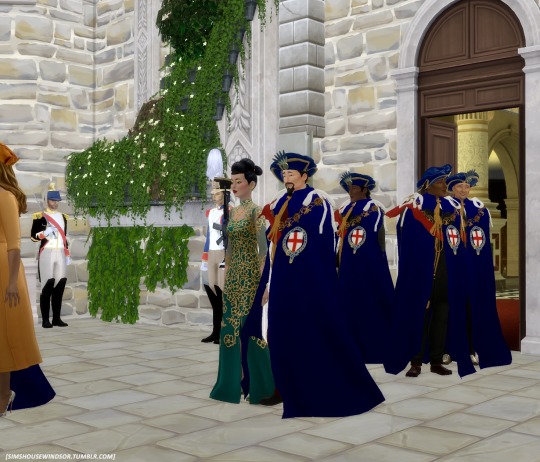
Installed as a Stranger Knight of the Garter in 2014, this year also marked The Emperor of Mt Komorebi's attendance since 2022. The two countries have been strong allies for over a century.
#simshousewindsor#simshousewindsor garter day#simshousewindsor royal engagements#ts4#simshousewindsor knights of the garter#ts4 royalty#simshousewindsor royalty#simshousewindsor ts4#sims 4 simblr#simshousewindsor on snn#simshousewindsor investiture#sims 4 story#SNN has the tea#simshousewindsor monarchy#simshousewindsor royal residence#SNN on ts4#sims 4 monarchy#sims 4 royal family
14 notes
·
View notes
Text








To thank you all for being patient while I finish Forzen's reference, have some funny doodles I made from Joshua's point of view!
#hlvrai au#svc au#sweet voice cafe#Benny#SVC Darnold#George Mantel#Gordon Martinez#Corgi Sunkist#Tommy Neapolitan#Manager Bubby#Manager Coomer#doodles#HarmonyTRE
22 notes
·
View notes
Note
Catherine was called a h*e when she was ar the airport with her father and Pippa. They called her mother doors to manual. They shouted abuse and stalked and ambushed her so horribly. Published photos of her when she came out of the pubs or bars. Waity Katie. BBC even discussed how Prince George might have darker skin tone because of her genes. But yes Rachel tell us about how you and your mother suffered extreme humiliation and racism. With zero proofs.
Don’t forget “Plastic princess designed to breed.” That one IMO crossed the line. I mean, they all did but this one was worst of the worst.
And blaming her for the paps taking pictures of her on a private holiday sunbathing from -what was it- 2 miles away?, and then blaming her for being on tour when they were published, and then blaming her for not having a reaction on camera about it.
Ah yes that infamous article written by Hillary Mantel. An author that Camilla chose to celebrate just recently.
45 notes
·
View notes
Text
Sex, Violence and Power in Hilary Mantel’s A Place of Greater Safety
Ever since I finished this book I’ve been thinking about how gendered and sexual violence kind of continually lurk in its subtext and then break into the explicit text in periodic but still-shocking instances of abuse. At first I thought this was mostly unrelated to the central political plot — a matter of historical realism as much as anything — but the more I’ve thought about it the more integral and connected to everything else it seems.
CW: #rape, #abuse, #csa
From the first chapters of the novel, we see that women and girls in this time and place lack the ability to say no to sex with their husbands. As a child, Robespierre hears his maternal grandfather accuse his father of having murdered his mother via repeat pregnancies. Much later, Danton’s wife Gabrielle has a conversation with other women about the impossibility of using birth control in her marriage. Within a year Gabrielle is dead, her death eerily similar to that of Robespierre’s mother.
Manon Roland is molested as a child and carries a fear and revulsion of sexuality with her throughout her life as a result.
And Camille is taken advantage of as a young adult by an older man who controls the future of his career. The fact that Camille’s mentor is sexually predatory seems to be common knowledge throughout the professional community, and instead of intervening to protect Camille they humiliate and ostracize him. When Camille disavows responsibility for the relationship to his father (“None of it was my fault” and “I was just a child”) his father outright scoffs at the idea he might be trying to say he was raped. Much later Danton himself marries a young teenage girl and, again, no one seems willing or quite able to intervene. You get the overwhelming sense that this is a society where sexual abuse and exploitation are treated as mildly unpleasant facts of life about which nothing can or should be done.
Later, Camille narrowly escapes being coerced into sex by Babette, the young daughter of Robespierre’s landlord. Camille’s lingering terror of her after this incident is horribly psychologically realistic, but also…. Babette, teen girl predator of adult men, is the one instance of sexual violence in the book that has never sat entirely right with me.
The real Elisabeth Duplay wrote in her memoirs that Georges Danton tried to kiss her and made inappropriate sexual comments to her when she was a teenager. I see no reason to believe this isn’t true, and in light of it I do think representing Elisabeth as a sexual predator herself is kind of a strange and tasteless choice. It feels like an outlier in Mantel’s otherwise very grounded and realistic portrait of an 18th century rape culture.
The choice to represent a single individual person who lived and died hundreds of years ago as a rapist when she probably wasn’t one itself might leave a slightly bad taste in my mouth, but on the other hand historical fiction as a genre does tend to necessitate casting some dead people in unflattering lights just to create conflict and make the plot run. This alone doesn’t bother me nearly as much as Babette’s later “false rape accusation” against Danton (which is obviously how we’re meant to interpret it in the book, as a lie devised for political expediency) and that accusation being framed as a deciding factor in Robespierre’s decision to condemn Danton to death.
For one thing, this plot beat feels out of step with the development of Robespierre and Danton’s uneasy alliance and rivalry throughout the rest of the novel. From the beginning of the revolution the two of them have a grudging respect for each other but don’t like each other, they don’t share one another’s fundamental values or worldview and those differences increasingly drive a wedge between them as the external pressure on both men mounts. Robespierre becomes more ruthless and paranoid while Danton becomes more violent, exploitative and corrupt. Danton is a sexual abuser by this point in the story. He has married a teenage girl and it’s implied that he’s raping her (by the very implication that she is a child he is having sex with, and by a line in her internal monologue where she hopes he’ll get drunk and fall asleep right away so she won’t have to have sex with him). Meanwhile Robespierre is growing more committed to a belief system wherein “the people” of France are inherently morally pure and if they behave badly it’s because of external bad influences, wherein immorality is a societal cancer that needs to be cut out by chopping off the heads of every Evil Person.
At the end of those two character arcs I would have believed Robespierre was willing to have Danton killed without any false accusation scene, without any out-and-out lies being told to him about Danton. It feels like Mantel didn’t have enough faith in her own story and her own central character arcs and did this weird punch-pulling maneuver at the last minute that weakens the story. Two complex and well-developed characters becoming more entrenched in and committed to their own worst qualities over time until they destroy one another is a strong arc with a strong conclusion. One character being “tricked” into betraying the other by a one-dimensionally villainous minor character is weak and unsatisfying.
Babette and her purely malicious opportunism also makes it feel like… the call is coming from outside the house, so to speak. Like, as Robespierre believes, there are individual Bad People who are the problem and if they could be gotten rid of all societal ills would disappear. But throughout the rest of the story we see that really isn’t the case. Perrin hires Camille out of a desire to take sexual advantage of him, but also treats Camille well enough that years later Camille is willing to risk his own position to save Perrin’s life during the September Massacres. Danton is a loyal friend, a charming and charismatic leader, and someone who likes to compromise and negotiate rather than make enemies. And he’s also an abuser, a sexual predator, and a murderer (especially if you accept Danton’s own judgment that he killed Gabrielle “by unkindness”). When Manon runs into her own rapist years later she observes that he is “a perfectly ordinary young man”.
This is a more compelling and a more true portrait of a culture where exploitation and coercion are baked into the “normal” social structure.
Mirabeau has this internal monologue near the beginning that feels to me like the closest thing APoGS has to a thesis statement:
When you get down to it, he thought, there’s not much difference between politics and sex; it’s all about power. He didn’t suppose he was the first person in the world to make this observation. It’s a question of seduction, and how fast and cheap you can effect it.
So like, we’re all here in politics trying to accrue power. (Even if we hope to use that power for good.) We’re trying to exert as much control as we can over as many people as possible. We’re trying to coerce and manipulate and bribe each other. The methods of the outside world are not alien to the revolution; they are inside it from its genesis and present within it at every step of the way. And much, much later the revolutionary government will collapse into chaos not because of the foreign plots against it that Robespierre imagines but because of internal factional power struggles turning desperate and bloody and murderous.
From Robespierre’s first introduction to the story, we are shown that he has an intertwined horror of sexuality and abuses of power. He understands that his mother’s death was a result of abusive or “excessive” sexual behavior on the part of his father. He understands that as an illegitimately conceived child he would not exist if not for his parents’ immoral sexual excess. He spends the rest of his life trying to distance himself from that legacy and to prove he’s nothing like his father.
Asking himself why he’s so afraid of foreign political conspiracies, Robespierre directly draws the link to his own bodily alienation:
Why, he asked (since he is a reasonable man), does he fear conspiracy where no one else does?
And answered, well, I fear what I have past cause to fear. And these are the conspirators within: the heart that flutters, the head that aches, the gut that won’t digest, and eyes that, increasingly, cannot bear bright sunlight. Behind them is the master conspirator, the occult part of the mind.
Robespierre becomes obsessed with the idea that anyone whose policies he disapproves is a malicious foreign agent, bent on the destruction of the republic. This idea particularly takes root when people whose political views he otherwise shares advocate starting a war. Robespierre cannot accept the possibility that warmongering is an honest miscalculation — that people brought up surrounded by propaganda about glorious military triumphs might sincerely believe war could be a good thing for the republic.
He can’t accept that the violence he abhors is in his allies, that it’s in The People, that it’s in him. He can’t accept that Camille is sullied by sexual deviance, or that Danton could be both a powerful force for political stability and a corrupt, largely amoral bully. Robespierre can’t cope with the murky ambiguity and ambivalence that lurks in the “occult part of the mind”; he can’t bear to think of himself or anyone else he loves as a body capable of sex and violence. So he destroys Camille and destroys Danton and we know that he’ll be killed himself a few months later. I imagine him finally keeling over after slowly and gradually bleeding out from a self-inflicted wound, a self-surgery, a botched organ removal. He tries to excise the impurities from his own life and finds he can’t survive without them. He cannot bring himself to negotiate or make peace with the “conspirator within” and instead destroys himself completely.
37 notes
·
View notes
Note
I was reading your posts about how badly most/all historical fiction and period dramas are when it comes to faithful portrayals and was wondering about your thoughts on Wolf Hall, whether you read it, watched it, or both. And also, are there examples that you feel do it well? Or are there examples where they get it wrong but you still enjoy them? (Can you tell I’ve been on a historical fiction kick lately?) I know that’s a lot of questions, so please don’t feel obligated to answer them.
oh boy, this is... complicated. i'll start off with wolf hall, because that will probably be easier: necessary disclaimer that i have not watched or read all of wolf hall, but i have read a significant chunk of the first book.
firstly, i actually enjoyed reading wolf hall a lot. there are a couple of bits that grated me when i read it (iirc it suggests that henry viii was to become archbishop of canterbury before the death of his brother, which is emphatically not true; nitpicky, i know, but it's one of the misleading "fun facts" you often hear about henry viii), but for the most part i found it rather refreshing. i have to praise hilary mantel's writing style, of course; it's beautiful prose, and a relieving change from first person present tense narratives, which are bad. (disclaimer: this is a personal opinion. i happen to think that 99% of all first person narratives are utter shit.) in terms of plot events, i think my favourite parts of wolf hall are cromwell with his wife and children, and him grieving his wife and children; the quiet reminders of their absence are heartbreaking.
now, onto the things i didn't like. i didn't love the tv show; nothing wrong with it, necessarily, it just didn't click with me - and it probably didn't help that when i watched it the screen light to room light balance was very off. and as for mantel herself... quite a few people have pointed out that her treatment of the women (notably anne boleyn and jane parker, her sister-in-law) in her series comes off as misogynistic, and i personally find the treatment of thomas more grating. essentially, she buys into a lot of the old narratives of jane parker being 'scheming' and betraying anne boleyn and her brother george; and her depiction of anne can similarly come off as that of a scheming woman and nothing more. there is an argument to be made that we're seeing this through cromwell's eyes, so naturally he's going to be biased against certain people - but mantel is the writer and she chose what she wrote. she seeks to balance out the classic depictions of cromwell as scheming and more as a literal saint, but it tips over into just making more look like a villain - things such as him choosing to educate his wife are warped into more being... evil? somehow? there's a double standard with cromwell vs the other characters: when cromwell is pious, it's devotion; when more is pious, it's fanaticism, and the same with cromwell vs the women in the books. finally, hilary mantel was transphobic. i'm not here to argue about that one.
granted, i don't think these things make wolf hall unforgivably bad, by any stretch of the imagination. i think it's a complex, flawed book and the same applies to the show. i think this youtube review summarises it well overall - and of course these things are always nuanced and complicated and so on and so forth.
there are shows which do historical fiction absolutely horribly, like the spanish princess. i have no interest in defending that, because, as far as i'm concerned, it's a mess not worth attacking; that's been done to death. i would also consider the vast majority of books by philippa gregory and alison weir to be a major waste of time. weir is also a non-fiction writer, and her non-fiction is exactly as bad, so for the love of good, please don't pick those up either. both authors like to draft in rape, magic (dear god, don't talk to me about the fucking magic), not-like-other-girls female characters, incest (???) and a bucket load of misogyny in lieu of actual plot. neither of them are good writers, either.
onto works which do an alright or complicated job. i think wolf hall belongs here - it does some things very well, some things... not so well. i'd also put becoming elizabeth here - as you've said, this is one where they get things wrong but i can still enjoy it. the show covers the reign of edward vi (1547-1553) and the teenage years of elizabeth i (about 13-19, so literally her teenage years). the good parts? it's a fantastic depiction of edward vi and mary - both are brilliantly cast and the acting from them is amazing. it incorporates black characters into authentic period roles, the clothing is really well done, and it shows most of the important parts of edward's reign. the bad parts? well, elizabeth is played by a woman in her late twenties. this lets the whole thing down, frankly. it's supposed to be a show about elizabeth, and yet edward or mary could easily replace her as protagonists - i don't think the actor playing her is great, personally. and then there's the fact that this show portrays the grooming of elizabeth by thomas seymour. the show actually makes their relationship out to be genuine and the two sleep together, a deviation from history and a particularly troubling one given that the real elizabeth was uncomfortable with seymour's advances and actively tried to avoid him. it also spends six of its eight episodes on seymour when seymour was beheaded a third of the way through edward's reign. thus, it has its upsides and its major downsides - oh, and the characters say fuck a lot, which is mildly annoying. but i can enjoy it, as long as elizabeth's not talking and they're not focusing too much on seymour... a bit of a letdown from a show supposedly about her.
there's also the tudors, which is a bit of a mixed bag - it makes some inexplicable changes from history, but it often uses quotations from tudor sources in its dialogue. the casting can be a bit... wonky, but it does have its moments, and offers a somewhat more balanced version of more vs cromwell. i don't particularly like it because it often modernises the characters a bit - and i don't want that! making characters act like modern people seriously misses the point: this is historical fiction, not a modern thriller or whatever. the girlbossification of historical women who were often seriously held back by the men around them and wielded influence in rather different ways to what we think of as strong women is exhausting.
and there is historical fiction which i really enjoy. dissolution (and its sequels) is a murder mystery series by c. j. sansom, narrated by the fictional matthew shardlake, a disabled king's commissioner working for cromwell. he ends up investigating the murder of another commissioner at a monastery in scarnsea. it deals with the issues of religion, gender, and disability in very interesting ways; matthew is not infallible and clearly holds some very tudor views of the world. it's a richly-written world and it really does feel like you're in 1530s england, and i really recommend it. i also like becket (1964) and the lion in winter, neither of which are particularly striving for accuracy - but they're good dramas and brilliantly acted, and, you know, maybe henry ii was secretly in love with thomas becket. (both are heartwrenching films and i will never be over: 'You give the lions of England back to me like a little boy who doesn't want to play anymore. I would have gone to war with all England's might behind me, and even against England's interests, to defend you, Thomas. I would have given away my life laughingly for you. Only I loved you and you didn't love me. That's the difference.') my feelings on bill (2015) are more or less the same - it's an intentionally ahistorical film, and it works because it's well-written and not trying to accurately represent the past. the '70s series like the six wives of henry viii and the shadow of the tower are really enjoyable, too - because they actually cared about making decent series about the tudors relying on the actual events which transpired during the era!
i'll leave the question of costuming out in the open; i think this youtube video has some good points on whether period-accurate costuming is essential. i like it, personally, but i'm not going to be furious at a missed french hood; the only thing that will truly make me furious is a french hood with no veil. either bother, or don't bother! don't... don't do neither, jesus christ! as for historical accuracy in general - i think that's a question which will never have one true answer. personally, i do value a rough adherence to the historical timeline, at least for fairly well-know facts like, i don't know, henry viii having two sisters? why does the tudors merge them into one person? what? anyway. i think these posts offer some valuable insight into how vague and murky a concept historical accuracy really is and how it can be wielded as a weapon against people rather than in the interests of a good story (read at your own peril - they are quite long). there is also the problem of hindsight - as readers, we know that edward vi will die at only fifteen. the average person at the time did not! well, not until 1553. the point is, books where the narrator has seemingly prophetic powers or knowledge of future events are unrealistic. what i think is most important is writing stories that more or less accord to the timeline of history in the general details and capturing the attitudes of people who lived in the past decently. this is what really brings historical fiction to life, in my opinion. these also offer up good opportunities for parody and satire - a film which intentionally gets history wrong Because Incest is frustrating, but a film which intentionally gets history wrong to parody it, like blackadder, can be incredibly entertaining. inaccuracy is not always bad. that said, if you don't make henry viii ginger, i will hate you forever. soz. as for language - it's ridiculous to expect dialogue to be written 100% in middle english or what-have-you, but the occasional 'god's bones!' instead of 'oh my god' would be nice, and an avoidance of just putting a load of fucks in there...
and finally, for the elephant in the room... misogyny. there are certainly other -isms which permeate historical fiction as they do everything else, but this is the big one. so many depictions of women in historical fiction uncritically buy into the narratives of misogynistic medieval commentators which we have inherited from centuries of men recycling them. like calling women sluts, or witches, or writing them as genuinely sleeping with a male relative - taking the slander against them literally. like boxing women into a few stereotypes - docile and submissive; scheming bitch; old hag; and whore. like sexing up rapists and groomers. like forgiving historical men for things we condemn historical women for.
i hope this helped! i have many thoughts, none of which are easily summarised. i don't know if there's a right answer to this. but i do know one thing: the white princess is bad. thank you for the ask!
11 notes
·
View notes
Text
January Prompt: Envelope
For @sherlockchallenge's January prompt
First the guys from Bakerstreet:

Sherlock Holmes, John Watson, and George Lestrade under the cut
Sherlock Holmes
“Alright, MC” Sherlock leveled his gaze at them. “You have three envelopes before you, and you need to pick which one to decide what we will be doing tonight.”
Their eyes narrowed, “is that it?”
“Of course,” he smiled, “just pick one of the three. Of course there are clues on the envelopes themselves as to what they are. So I would love to see you guess which one is which.”
“I see,” they looked over the envelopes carefully. All of them seemed similar to each other, though as they picked them up they could feel the different textures and weights. They lifted the envelopes up towards the lights, but whatever was in them were wrapped in additional paper to obscure them from being read through the envelope.
“Of course, it wouldn’t be that easy.” Sherlock leaned back, smiling as he watched them examine the envelopes.
They lifted another up for closer inspection, looking along the seams when a peculiar smell wrinkled their nose. They pulled back and looked up at Sherlock curiously. It smelled a little musty, like a zoo. They set it aside, certain that that was the answer.
Then they grabbed the second envelope and looked it over and during the search they found a faded indent on the corner of the paper, tilting it to make it easier to read, they saw ‘Wishmas’ Waterloo, exit 2. Their eyes narrowed as they wondered what that could mean, possibly a show?
Setting it down they reached for the final envelope but were surprised at how it felt gritty and lighter. They gently felt along the envelope and realized the paper folded inside was the only thing there. Either the item was written on that page or- closer examination of the envelope showed an imprint of a shoe on the envelope as if someone stepped on it, but it seemed to be centered perfectly on the envelope. They stole a glance up at Sherlock who seemed to have not moved an inch, but his piercing dark eyes seemed even more pleased as he knew what they had seen.
The odd thing about the imprint was that it was the shape of a high-heeled shoe. MC’s eyes drifted up towards the mantel and the pink shoe that sat there. “Very good.” Sherlock leaned forward. “Do you want to guess the first two and make your pick or…?”
“This one… is it for the zoo?” They held up the first envelope.
“It is, and the second?”
“Tickets for a show called ‘Wishmas’?” They sounded less sure of that one, but the grin on Sherlock’s face told them they were spot on.
“Do you want to choose between those two or would you like to see where this third one leads you?”
MC glanced at the shoe, curiosity prickling in their mind. “Since you went through all this trouble…” They stood up and Sherlock’s smile lit up with pride.
John Watson
MC flopped down on the bed in the hotel room. Their feet sore from that day’s work on set. Maybe they should talk with the costume department about the shoes they choose for that costume. At this rate, they would need to cover up the bruises and blisters for any future scene without their shoes. They wrinkled her nose and sighed. They hadn’t realized they were nodding off until there was a knock at their door.
On the other side of the door was Diana holding out a cup of cinnamon hot chocolate and another postcard. “Are you sure that Doctor of yours doesn’t have a brother or…” The tall woman teased as she handed them over to MC.
“He has an older brother, but I haven’t met him yet.” They took the drink and the postcard to the sofa, curling up as they smiled down at the card.
“Well, tell that Doctor I want his brother’s contact information as soon as possible. He’s just so cute sending these to you.” Diana shut the door behind her, and smirked at MC as they read the postcard, a light pink hue growing on their cheeks.
‘To my MC, I hope you had a good day on set. I cannot wait to see you performing again. But, Sherlock is driving me crazy. He has rearranged the sitting room in an attempt to recreate a layout from this crime scene the other day to show Lestrade how ridiculous he was being with believing the wife had done it. Though honestly the only one being ridiculous is Sherlock! Mikah keeps asking if I’ve heard back from you, and while I know we talk on the phone, I just cannot help wanting to write to you. Show you that even when we’re not talking, my thoughts are on you and the peace you bring into my life. If you ever get lonely when you’re working you can hold onto my postcards, or send me a text. Just know, even though you’re the one away from here, I am feeling homesick. All my love, John.’
George Lestrade
“I’m sorry, MC, I’m really, really, sorry.” George couldn’t meet their gaze as he scuffed his shoe along the floor. “I was really looking forward to being with you tonight, but-”
“Well, you go out there and you tell those criminals that they messed with the wrong inspector.” MC stepped close, gently touching his cheeks and turning his attention back to them.
As he smiled they could see him relax and lean into the touch. “You bet I will, but try to have a good night without me. Okay?” He leaned forward and kissed their forehead, as he pulled back they could see the blush on his cheek. He turned to leave but quickly pivoted back to them, “but not too good, okay? I mean.. of course, have a good night, but not too good as if you don’t miss me or forget about me, which isn’t to say I’m more important than you having a good night but I just-”
“I’ll be taking it easy tonight, but if you can hurry back home I’ll be looking forward to watching our show together. Maybe you can grab some takeaway on your way home?”
“It might be a busy night…” he frowned.
“Maybe, but when these criminals face off against the Inspector Lestrade?”
His lip twitched with a smile, and then he pulled MC in for a tight hug. “Promise you’ll really take it easy tonight?”
“Agreed.” They promised. George gave them a quick kiss and stepped out the door, only to reopen it again and steal 3 more kisses, each one longer than the last. Then finally, as his phone started to ring, he hurried down the street.
Once he was out of the house, MC started to look around, wondering how to spend their night. They wandered into the bedroom, noting how messy it was, and decided to tidy up and were surprised to find an envelope hidden between their bed and George’s nightstand. They thought that maybe it had slipped down there by accident. But when they pulled it out their eyes were wide as they saw their name written across the top of the envelope. Inside they pulled out several sheets of paper, each of them with some words scratched out, a few of them crumbled up, but most of them said the same things:
‘To the most wonderful, best, darling, beautiful, handsome, loving person I have ever known. Your support means more to me than I can ever express. The way you believe in me when everything else seems to fall apart, the way you are there for me when I get down on myself. You make me believe I can be a better person, not just a better inspector. I forget my worries when I hear your laugh, I want to protect your smile against everything. The way you light up my life when you’re excited over a new project. I cannot wait for those days I get to see you on the screen or stage, because of how electric you are when you’re living your dreams. And-‘
Then it trails off, and MC smiles seeing the effort and love that George put into these letters he did not mean for them to see.
Their phone chimes as they receive a message from George, ‘made it safe to work, I love you!’
‘I love you too.’
Note: I have decided going forward that Simon would be going with a new preferred name 'Diana'.
#guard me sherlock#sherlock challenge#Sherlock Holmes#John Watson#George Lestrade#Inspector Lestrade
12 notes
·
View notes
Photo
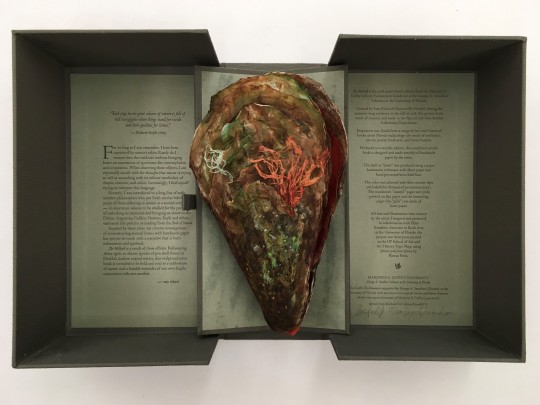
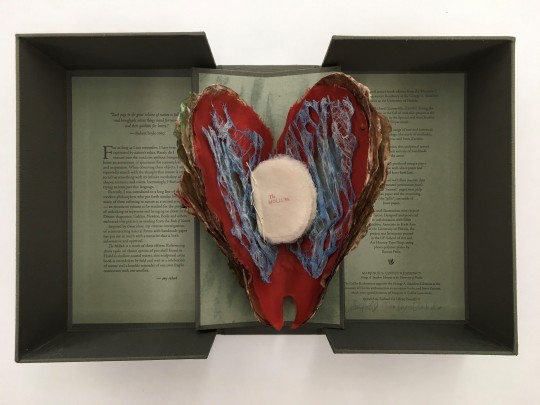
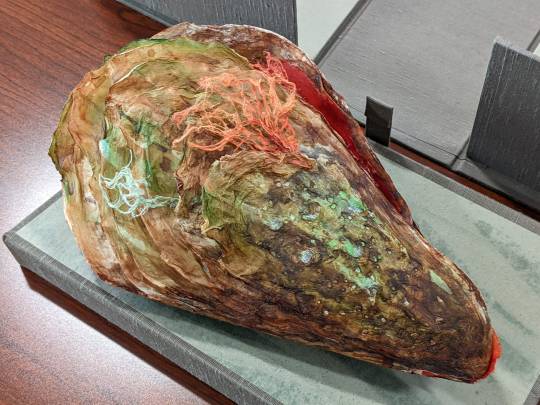
“Referencing Atrina rigida, an elusive species of pen shell found in Florida's shallow coastal waters, this sculptural artist book is intended to be held and read as a celebration of nature and a humble reminder of our own fragile connection with one another.
The Mollusk is the 2018 artist's book edition from the Marjorie S. Coffey Library Endowment Residency at the George A. Smathers Libraries at the University of Florida. The book was created by Amy Richard during the semester-long residency in the fall of 2018. This project is the result of research and study in the Harold and Mary Jean Hanson Rare Book Collection in the Special and Area Studies Collections Department. Inspiration was found from a range of rare and historical books about Florida malacology (the study of mollusks), nature, poetry, book arts and livres d'artiste.
Produced as a variable edition, this sculptural artist's book is designed and made entirely of handmade paper by the artist. The shell serves as a "cover" and was produced using a paper lamination technique with abaca paper and hand processed kozo bark lace. Inside the shell between the layers of translucent "mantel" pages, pulp printed on flax paper, are the "gills", made of kozo paper.”
--artist’s statement
(more at The Mollusk by Richard, Amy Koski, 1962- Library Press@UF, 2018 · Special Collections and Archives)
#bookarts#paper arts#artists book#artists books#mollusk#rare books#rarebooks#special collections#specialcollections#mizzou#university of missouri#libraries#fb#kelli h
52 notes
·
View notes